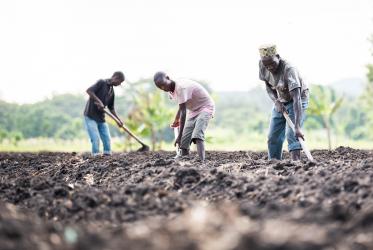Seventy years ago, at its founding, the World Council of Churches (WCC) had already engaged in years of diaconal work, facilitating resettlement of hundreds of thousands of refugees after World War II.
Now, two generations later, the WCC and sister ecumenical organizations have joined forces to re-envision and reignite diakonia for a new and radically different context.
Four years of consultation and collaboration by a working group from the WCC, ACT Alliance and the Lutheran World Federation have yielded a landmark new document on the church’s service in the world.
Called to Transformative Action: Ecumenical Diakonia attempts a comprehensive approach, building on revitalized relationships among the three ecumenical organizations, renewed understandings of church and mission, and close analysis of contemporary global trends in the related fields of development, disaster relief, advocacy, and international frameworks for action.
Though well-versed in biblical, historical and theological perspectives, as well as the contemporary context of church service, the wholistic document’s aim is ultimately pragmatic, it states, “to clarify the understanding of ecumenical diakonia and provide a common platform for acting and reflecting together. It outlines the theological components of diakonia and offers practical content for those engaged in such service.”
“We hope that this document will become a vital tool in the ongoing Pilgrimage of Justice and Peace. The ambitious rethinking of diakonia was undertaken to facilitate and energize churches, ecumenical organizations, and specialized ministries in an age marked by greater needs and fewer resources,” said Isabel Apawo Phiri, deputy general secretary of the WCC. “It really bridges our largely theological understandings of diakonia, along with learning from those at the margins, with the more secular, rights-based approach. That makes possible collaboration across all kinds of boundaries and lines, including employing the UN’s Sustainable Development Goals as an apt platform for diakonia and advocacy.”
The document itself, which will be presented to the WCC’s Central Committee at its upcoming meeting in June in Geneva, is translated in English, German, French, Spanish and Portuguese, and also includes a study guide. WCC member churches are invited to provide their feedback by 8 June 2018.
Continued Phiri: “The scale and gravity of our new situation and the radical openness of the new perspective really necessitate an ecumenical approach,” said Phiri. “So much is at stake in our work as churches join together to confront poverty, hunger, crises in global health—all entrenched by an unresponsive and inequitable financial structure. We sincerely hope that churches, agencies and training programmes will study this document to discern where they are called and how to intervene strategically and effectively in the areas of most need within their context.”











